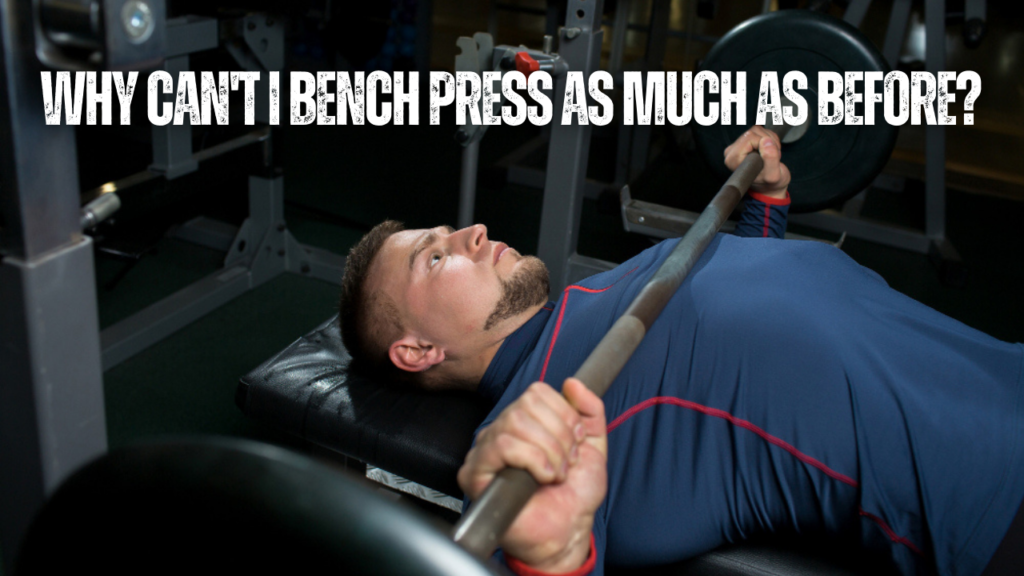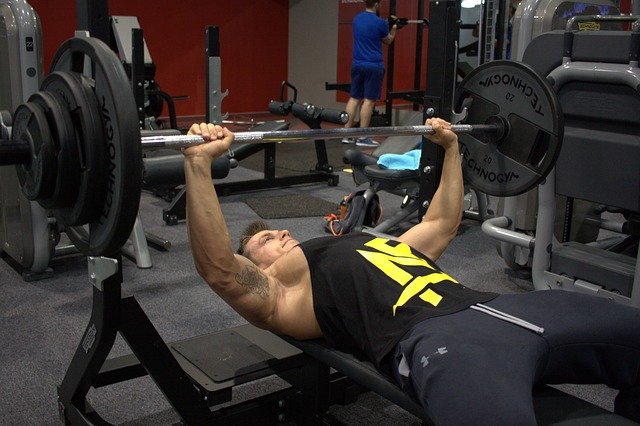
Why Can’t I Bench Press As Much As Before? 16 Factors To Consider
If you’ve been lifting weights for a while, chances are you have experienced the frustration of hitting a plateau. You can no longer move as much weight on the bench press as before or increase it at the rate that you were originally doing. It’s really disheartening to realize that your hard work and dedication aren’t paying off and instead of making progress, it feels like every day is just more of the same.
But don’t worry – there are some tips and tricks that can help get your gains back in gear! In this blog post, I will share with you why bench pressing isn’t progressing as much as it used to, identify potential causes, and then provide solutions so that the next time you hit up the gym your improvements will speak for themselves. Let’s get started!
Why Can’t I Bench Press As Much As Before?
There can be many reasons why you’re not bench pressing as much as before. It could be due to overtraining, injuries, lack of intensity, or even poor form and technique. You may also need to build up secondary muscle groups that help support the main lift and make sure your diet is set up for progress. Have you taken a break from benching? Do you consistently progressive overload your lifts? And do you have a specific plan and goals to keep track of your improvement? Your imbalances may also be showing up if you’re not taking the time to work on them. The best way to get back on track is to go back to basics and make sure all the important elements for success are present. First, warm up and do some light stretching to get your body ready for the workout. Make sure you take enough rest and recovery time in between sets and workouts. Secondly, ensure that your form is on point – bad form can lead to injuries so be aware of what’s going on and adjust accordingly. Finally, make sure you’re progressive overload your bench press by adding weight or reps each time you hit it up in the gym. Once you have these basics covered, then you can start to look at more advanced strategies such as periodization and varying your rep ranges for maximum gains.
Let us now look more in-depth at why you can’t bench press as much as before and what you can do to get back on track…
1. Plateauing
The most common cause of your bench press not progressing is plateauing. This can often be due to poor technique, insufficient rest or recovery times, or even just boredom with the same old routine. To break through a plateau and start getting results again try changing up your rep ranges and exercises and make sure you are consistently progressive overload.
If you are new to lifting, you may have found that you have made good progress up until a certain point…now. This is because your nervous system needs to adapt and master the movements. Once you become more comfortable with the lift, your body will be able to move more weight for longer periods of time.
This means you need to continually mix things up in order to keep progressing. You can do this by altering the programming, changing up your exercises regularly or even increasing the speed of the lift to name a few.
2. Overtraining
Overtraining can also be a factor in why you are not bench pressing as much as before. This is especially true if you have been pushing yourself too hard and not taking sufficient rest days. Overtraining can lead to fatigue, injuries, mental burnout and decreased performance due to your body’s inability to recover between workouts.
You might be dead set on trying to improve your chest ASAP, which is fine, but you need to understand your body’s limits and know when to back off and take a rest day. Make sure you are taking enough breaks and getting adequate sleep so that your body can fully recover and be ready for the next session.
Make sure you are always aware of how your body is feeling and take at least 48 hours of rest in between heavy chest sessions. It’s also a good idea to use active recovery techniques such as foam rolling and stretching instead of just lying on the couch all day. This will help keep your muscles loose and prevent muscle imbalances from forming.
3. Injuries
If you have suffered from any knocks or niggles in the past, then this could be why you are not bench pressing as much. Painful or strained muscles can limit your strength and range of motion, making it hard to move through full ranges and lift heavy weights.
If you think that you have an injury, then the best thing to do is to get it checked out by a professional. A doctor or qualified physio should be able to help diagnose the issue, give you advice on how to treat it and get you back in the gym as soon as possible.
Once again, if you are dealing with an injury then make sure that you take your time and don’t rush into anything too quickly. Injuries can take some time to fully heal and trying to lift too soon may cause more damage. Take it slow and ease back into training with light weights until your body is used to the movements and you can lift more weight without pain.
4. Your focus and expectations
Are you keeping track of your progress? Do you have consistent goals that you are working towards? Your bench press may not be progressing because you are simply expecting too much, too soon. Plus the stresses of modern-day living might have an effect on your ability to lift what you did before. If you are stressed out and overworked, then your body may not be able to handle the same amount of weight that you could previously.
It’s easy to get disheartened when you don’t see results right away and give up on your goals. However, if you want to keep progressing then it’s important that you stay focused and motivated, no matter how small the gains may be.
Set realistic goals and create a plan for how you are going to achieve them. Track your progress each session and make adjustments as necessary. This will help keep you on track towards reaching your goal and help you become a better bencher.
5. Lack intensity
If you are turning up to the gym and simply going through the motions, or you lack any direction with your training, then it’s going to be difficult for you to reach your goals.
If you want to maximise your bench press results then you need to give every rep 100%. That means pushing yourself as hard as you can, even when the weight feels heavy. You also need to have a plan before each session so that you know exactly how much weight to lift, what exercises to do and which muscles to focus on.
Finally, make sure that you are keeping yourself motivated throughout your session. This could be anything from music or podcasts in the background, having a training buddy or even just setting small mini-goals for each set. It doesn’t matter what works for you, as long as you are pushing yourself each time.
6. Build secondary muscles
As you will be well aware, the bench press is more than just chest muscles. It engages a range of other muscle groups such as the triceps, shoulders and even your core.
If you feel like your chest is not getting any stronger, then it could be because those other muscles are lagging behind. Doing exercises that work on these smaller muscle groups can help build up their strength and prevent them from becoming a weak link.
For example, doing isolation exercises such as triceps extensions or shoulder presses can help strengthen those muscle groups. This will free up more energy for your chest and allow you to lift heavier weights. Be sure to include these exercises in your routine and focus on technique just as much as with the main lifts. Remember, the bench press is a compound movement which works multiple muscle groups at once.
Related: Why Do My Palms Hurt While Doing Push Ups?
7. Warm up and flexibility
In order to lift heavy weights, you need to make sure that your body is ready. That means taking the time to do a proper warm-up and stretching out any tight muscles in the area. Stretching can help increase flexibility and range of motion, which will make it easier for you to move through full ranges and ultimately help you lift more weight.
Always make sure that you are warmed up before attempting to bench press any heavy weights. This could include dynamic stretches and foam rolling to get the blood flowing, or light sets of the exercise itself with lighter weights. Doing this will help prepare your body for heavier lifts and prevent any potential injuries.
8. Rest and recovery
It’s important to understand that your body needs time to rest and recover. If you are benching too often without giving your body enough time to rest, then it is likely that your progress will suffer.
Make sure that you are scheduling sufficient rest days between sessions and adequately fuelling the body with good nutrition. This will help the body to rebuild and become stronger so that you can lift heavier weights in future sessions.
Additionally, look into other recovery techniques such as massage or Yoga to reduce muscle tension and improve circulation. This will improve your overall performance and keep you benching for longer!

9. You don’t train enough
If you’re not bench pressing as much as before then it could be because you simply don’t train enough. You need to make sure that you are consistently challenging yourself and progressing your lifts if you want to see results.
If you are only training sporadically and don’t have a consistent plan then it is likely that your progress will plateau, so make sure you create a structured program and follow it. Additionally, make sure that you are tracking your training and taking note of any improvements or regressions. This can help to identify any weak points in your technique and motivate you to keep pushing forward.
Some people are lucky in the sense that they are gifted with natural strength, whereas others have to work harder in order to reach their goals. What I mean is, you can’t just expect to show up now and again and be where you want to be, you have to put in the work.
10. Your form and technique are better
You may not be bench pressing as much as before because your form and technique have improved. As with any exercise, if you are performing it wrong then you will not progress or get the most out of the lift.
Take some time to review your technique videos and make sure that your form is correct throughout each repetition. Pay attention to where your elbows are positioned and keep your core engaged. It’s also important to remember that with heavier weights, it is more difficult for the body to maintain good form, so be aware of this and ensure you stay safe at all times.
By taking the time to perfect your technique, you may find that the amount of weight you can bench increases as your body gets used to the correct technique.
11. Your form needs work
If you find that your form still isn’t quite up to par, this could be the root of your issues. Cheating in the exercise by bouncing a bar off your chest or not lowering it enough may result in difficulty when trying to add more weight. This might cause someone to feel overwhelmed and unable to make any further progress.
Your body will only be able to do a certain amount when the exercise is being done incorrectly or if you have picked up some bad habits along the way, which means you may have to go back to the drawing board in order to lift the amount of weight you did before.
Other things such as flaring your elbows, insufficient grip, not having a straight bar path, and letting your butt come off of the bench during the lift can also cause a decrease in performance. Make sure that you are taking the time to focus on your form during each set. This will help you feel more comfortable with heavier weights and improve your ability to move through full ranges of motion with good technique.
Related: Why Do I Get Forearm Pain When Doing Dips?
12. Your diet is not up to par
Your diet can also play a role in your bench press performance. Eating enough protein and other essential nutrients is important for building muscle, helping you to lift heavier weights more easily.
Make sure you are getting enough calories from healthy sources such as whole grains, lean meats, fruits, vegetables, and nuts. Also, be sure to get enough carbohydrates as they are essential for energy and help to fuel your workouts.
It is also important to stay hydrated before, during, and after your workout so that you can perform at peak efficiency. Eating a balanced diet will help ensure that your body has all the necessary nutrients it needs in order to support heavy lifting.
13. Have you taken a break?
If you have taken some time away from the gym recently for any reason, then this might be the reason why you aren’t able to lift as much as you did before. You will know that working towards your fitness goals takes time and doesn’t happen overnight.
This means that if you have had a few months off for example, then your body will have lost some of its strength and muscle mass. It is important to remember that taking a break from time to time is beneficial for the body in order to rest and recover, so don’t be too hard on yourself if you have taken a break.
Once you are ready to get back into your routine, start slowly with lighter weights and as you become more comfortable, increase the weights and challenge yourself again. This will help make sure that your body is strong enough to handle heavier weights and prevent injuries from occurring. If you had it before then you can get it back again, it may just mean there’s a bit of graft involved to get you there, but that’s part of the fun right?
14. Progressive overload
Progressive overload is essential to any strength training program. This means gradually increasing the amount of weight or reps you use each week or session in order to progressively add stress to your body so that it can grow.
If you have been stuck at the same weight for a while then this could be why you aren’t able to lift as much as before. Try gradually increasing the weight each week and see how your body responds. This will help your muscles gain strength, size, and endurance.
Making the smallest increase in weight will make a massive difference in the long run, so don’t be afraid to challenge yourself. Getting out of your comfort zone is the only way to see real results.

15. Your imbalances are showing up
If you don’t take the time to work on strengthening your muscles that are imbalanced, it can affect how much weight you are able to lift. This could be due to muscle tightness that occurs from not stretching or training certain muscle groups frequently enough. If you have been neglecting stability exercises, then this could be why you can’t reach your bench press goals.
Adding balance work into your routine such as core and rotational exercises will help build the strength of secondary muscle groups that are essential for supporting your main lift. Once you have balanced out any imbalances you may experience an increase in performance.
It is important to work on all of the muscles around the bench press movement in order to make sure that your body is balanced. This means engaging in exercises such as chest flys, lateral raises and tricep pushdowns in order to ensure that all of the muscles are being worked and strengthened.
Taking the time to work on these secondary muscle groups will help you balance out your strength and improve not only how much you can bench press, but also your form and technique. So don’t forget to include these exercises in your routine.
16. Go back to basics
Finally, if all else fails it is important to go back to basics and work on your form and technique. This means setting aside time for practice with light weights, focusing on the full range of motion and engaging all of the necessary muscle groups. It might be tedious but this will help you build a strong foundation from which you can gradually increase the weight.
It may also be beneficial to consult with a personal trainer or coach in order to get one-on-one guidance and advice tailored to your own goals and abilities. Working with someone who knows what you need can be the difference between success and failure, so don’t hesitate to reach out for help if needed.
They may also be able to point out any mistakes you have been making, which might improve your bench press considerably.
FAQs
Why has my bench press decreased?
This is a problem that many lifters face, and there are several potential causes. Improper form could be the culprit – if you’re not lifting with good technique, your body won’t be able to move as much weight as it could before. Additionally, inadequate rest between workouts can also lead to decreased strength, meaning that you need to give yourself adequate recovery time. It’s also possible that you’re simply not pushing yourself hard enough, and if so, you should consider increasing the weight or number of reps that you do during each set. Finally, dietary issues could be causing your decreased bench press; make sure you’re getting enough protein for muscle-building and the calories necessary to sustain your strength. If you’ve eliminated all of these potential causes and still aren’t making progress, it may be time to consider switching up your routine or consulting a professional. Hopefully, this advice will help you get back to benching big numbers!
Why is my bench improving so slowly?
The answer to this question is likely multi-faceted. It could be due to a number of factors, such as not working out with enough intensity, poor form, inadequate rest between workouts, or insufficient nutrition. Additionally, you may have simply plateaued in your progress and need to switch up your routine or add more variety to your exercises in order to continue seeing gains. It’s important to make sure that you’re setting realistic goals and allowing yourself enough time to reach them. If it has been a while since you’ve experienced any real improvements, then try changing up your workouts, focusing on proper form, eating a balanced diet, and getting plenty of rest between sessions in order to optimize your performance. With patience and dedication, you should be able to make meaningful progress on your bench press.
What is limiting my bench press?
There are a few potential factors that could be limiting your bench press progress. These include your current strength level, muscular imbalances between muscle groups, lack of strict form, and inadequate rest and recovery time. To maximize your gains from bench pressing, it’s important to focus on improving these elements:
Strength Level: Improving your strength level will help you to increase the weight that you can press. Focus on perfecting form, and gradually increasing the amount of weight used for each set.
Muscular Imbalances: Pay close attention to any muscular imbalances between opposing muscle groups (e.g., chest and back). If a particular muscle group is weak, focus on specific exercises to help strengthen it.
Form: Poor form can limit the amount of weight that you are able to press and could lead to injury. Make sure that you’re taking the time to perfect your form before increasing the weight. Focus on keeping your back flat and pushing with full extension at the elbow.
Rest and Recovery: Adequate rest and recovery time is essential for allowing the body to heal, adapt, and build new muscle tissue. Make sure that you’re getting an adequate amount of sleep each night and taking a full day of rest between workouts.
How do I fix my weak bench press?
The first step to improving your bench press is to focus on form. Make sure you are using the correct muscles and technique when lifting, as this will help you gain strength without risking injury. You should also work on increasing your strength by adding more weight or working with a partner for resistance exercises. Incorporating compound movements such as squats and deadlifts into your workout can help you build overall strength which will transfer to the bench press. Lastly, make sure that you are getting enough rest and recovery between workouts in order to give your body time to repair and rebuild. With dedication and consistency, you should be able to see improvements in your bench press strength over time.
Do push ups increase bench press?
The answer is yes, push ups can help to increase the amount of weight you are able to bench press. Push ups work many of the same muscles as the bench press and can be used as an effective warm up before your workout. By doing push ups regularly, you can strengthen your chest, triceps, shoulders, and core which are all important muscles used when bench pressing. Push ups also help to increase your muscular endurance and help you power through more reps without getting fatigued as quickly. This can be beneficial both when lifting heavier weights or doing more repetitions with lighter weights. Ultimately, push ups can be an effective way for you to improve your bench press strength over time.
Final thoughts…
If you’re not seeing the results you want with your bench press, it could be due to a number of things. From overtraining and injuries to lack of intensity or muscle imbalances; it is important to address each issue in order to get back on track and start making progress again.
Start by making sure your diet is set up for success and you are consistent in your training. Also, take the time to focus on form and technique with lighter weights, with progressive overload and don’t forget about working on any imbalances you have. This may mean adding balance work into your routine such as core exercises or consulting with a personal trainer.
Do you struggle to bench press what you did before and have these tips helped? Let me know in the comments below.
If you enjoy sport and use CBD to help with your recovery in between gruelling workouts, then you are in the right place. Here at Sport CBDs, we train hard and recover the best way possible…
We have regular workouts (check out the YouTube channel), CBD news and CBD products to help you gain that edge!
If you wanted to check out the reputable CBD we have on offer here at the site, then please head to the Sport CBDs Store (CLICK HERE). We also do fitness clothing and yoga accessories too.
Until next time, all the best…


